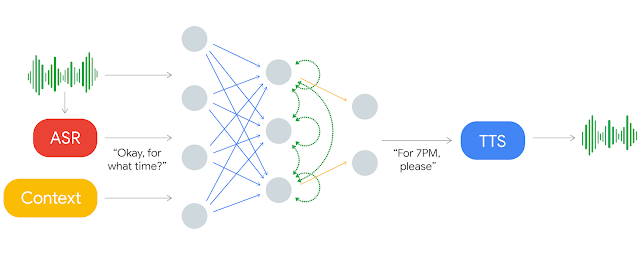 EMERGING TECH
EMERGING TECH
 EMERGING TECH
EMERGING TECH
 EMERGING TECH
EMERGING TECH
Google Inc.’s popular Assistant for mobile devices will soon be able to make phone calls on behalf of its users to perform tasks such as scheduling appointments at the hairdresser or booking a table at a restaurant.
The new capability has been made possible thanks to an artificial intelligence-based technology called Google Duplex, which dazzled the audience during a demo at its I/O developer conference today.
The robotic assistant sounds eerily humanlike, complete with the “um” and “ah” sounds and hesitations that most people make when considering their reply. The result is that it would be almost impossible to know that you were actually talking to a robot rather than a human.
Google said the whole point of Duplex is to carry out what it calls real-world tasks on the phone for people who don’t have the time or inclination to make a call themselves, or don’t have a real assistant to do it for them. Once the appointment or booking has been made, Google Assistant will then schedule it on the user’s calendar and send a notification.
Sundar Pichai, Google’s chief executive officer, presided over a demonstration of Duplex on stage at I/O, playing a recording of Google Assistant calling a hair salon to book an appointment.
To cheers from the audience, Google Assistant showed how it was perfectly able to understand the human’s voice, responding to those answers in almost human fashion. There was no indication from the call recipient that she had any clue she wasn’t talking to another human.
In a second demo, Assistant then called a restaurant in order to book a table for four persons. Despite a heavy accent and sometimes odd questions by the person answering the phone, the conversation proceeded seemingly naturally and the reservation was made without hassle.
Going by the demos, Google Duplex seems to be vastly superior to any kind of automated phone system currently available. Duplex can carry out natural interactions thanks to advancements the company has made in areas such as natural speech recognition, text-to-speech synthesis and the “incorporation of speech disfluencies” (the “hmms” and “uhs”), Principal Engineer Yaniv Leviathan (pictured, left) and Yossi Matias (right), vice president of engineering at Google, wrote in a blog post.

Incoming sound is processed through an ASR system. This produces text that is analyzed with context data and other inputs to produce a response text that is read aloud through the TTS system.
Despite Duplex’s clear superiority to anything else we’ve seen, one expert urged caution, saying that the technology still has a number of limitations. Abinash Tripathy, co-founder and chief strategy officer at Helpshift Inc., a provider of AI-based customer service software, said he sees serious drawbacks to the technology and how it will be applied in reality.
“While this moves the research needle forward to a truly AI-driven conversational world, the reality is that the most state-of-the-art natural language understanding has attained about only 70 percent accuracy, which will not be good enough for mainstream human consumption,” Tripathy said.
More concerning to many is that the technology was demonstrated in a way that indicated recipients of the calls didn’t know they weren’t talking to a human, raising ethical concerns. Google subsequently said this was a technology demonstration and that it believed there would need to be notifications but it didn’t yet know the best way to do that. One executive suggested it could say something like: “I’m the Google assistant and I’m calling for a client.”
Still, back on stage Pichai expressed his confidence that Duplex would prove useful for around 60 percent of small businesses in the U.S. that don’t currently have an online booking system in place. He added that Duplex can also call to make more general inquiries, such as asking for a businesses’ hours of operation on holidays, for example.
It’s planned that Duplex will make these kinds of calls automatically on behalf of Google, before posting that information online and making it accessible via Google Search and Google Maps. That would mean the business fielding fewer calls.
“Google is pushing AI a step further with Duplex – not only does it enable long-running conversations and context, it can maintain a material conversation too,” said Holger Mueller, principal analyst and vice president of Constellation Research Inc. “Behind the scenes, Google has extended TensorFlow, one more feather in the cap for its neural network, which is winning all over for now.”
Google said the Duplex technology is still under development and hasn’t announced a release date. However, it’s likely that some early adopters will be able to start testing the technology this summer within Google Assistant, in particular for making restaurant reservations and hair salon appointments and getting holiday hours.
THANK YOU